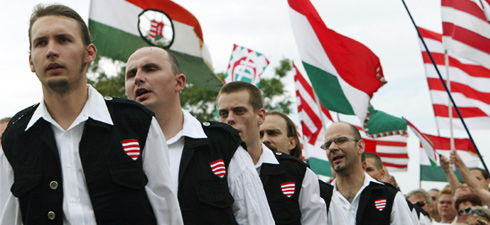At first glance, newly elected Hungarian MEP Krisztina Morvai should be a welcome addition to any parliament. Beautiful, blond and well educated, the press reports that she has achieved an ideal balance between family life (she is the mother of three children) and a career in politics. But the political positions Morvai advocates do not sit well with the image of the perfect female politician. In recent years, the one-time feminist has progressively changed her political vocabulary and views, a process that recently led her to stand for European elections at the head of the list presented by Jobbik, a party whose sole distinguishing trait has been an aggressive campaign targeting Hungary's Roma minority.
On the eve of the elections, party leader Gábor Vona declared, "Hungary belongs to Hungarians," and pledged that "with Jobbik, actions speak louder than words" — and it's the Hungarian Guard, a paramilitary militia with close links to Jobbik that is expected to implement this promised concrete action. To date the guards' main activities appear to be parading in uniforms similar to those worn by Hungarian fascists in the 1940s, and the organizing anti-Roma demonstrations.
The position adopted by Jobbik and the Hungarian Guard is so extreme, it even blames the Roma people for declining living standards in Hungary, which has been severely affected by the economic crisis. Sociologist Zoltán Pogatsa has described Jobbik's anti-Roma agenda as follows: "They tell people: look at how we are suffering in this economic crisis, while they (the Roma) take advantage of welfare payments from the state. There is a better way to spend the money they receive."
Investigators suspect the Hungarian Guard, which has recently been declared an illegal organization, of collusion in some of the numerous murders of Roma people, which have also prompted criticism of the police, who failed to take action to defend the Roma community. Shortly after midnight on February 23, in the Roma village of Tatárszentgyörgy, an unidentified attacker set fire to a house using a petrol bomb. When the residents of the house attempted to leave the burning building, the attacker opened fire, killing a father and his four-year-old son. Since last November, there have been five murders of Romas, and every week brings fresh news of further attacks on Roma villages. The police have acknowledged that the attacks were organized by the Hungarian Guard. However, this is a view not shared by the new Jobbik MEP, Krisztina Morvai, who in the run-up to elections suggested that the deaths in Hungary were the likely result of inter-Roma feuding.
Three independent organizations worked on the report on the Tatárszentgyörgy murders. Initially, the police refused to investigate the killings, arguing that the deaths had resulted from an accident. Furthermore, the report suggests that the police actually impeded the investigation. Senior police officers subsequently admitted that racism in the ranks was an issue in the police force. The Hungarian Chief of Police, József Bencz, even recently acknowledged that the 'professional' style execution of the attack did in fact imply that the the killers may have been soldiers or police officers.
The Roma have never had an easy life in Hungary, where they currently account for 10% of the population. However, according to government forecasts, on the basis of their higher birthrate the community will account for 20% of the population by 2050. The Jobbik party has made extensive use of these figures. and its members openly advocate the forced migration of the Roma population. A significant proportion of Hungarians view the Roma as criminals (it is estimated that up to 50% of inmates in Hungarian prisons have Roma origins). And although more than half of the population acknowledges that Jobbik is a dangerous party, it wants a "a solution" to the Romani issue.
The success of Jobbik has increasingly been viewed as a cause for concern in neighboring Slovakia, which Jobbik's representatives consider to be a historic annex of Hungary which by right should be controlled by Budapest. For Hungarian Prime Minister Gordon Bajnai, the success of extremists in the European elections is a major problem, in particular in his own country. In the aftermath of the major victory scored by the main right-wing opposition party Fidesz in the European vote, Jobbik has renewed its forceful demand for general elections, which should be held by the end of the year.
ITALY
Northern League lets loose fascist vigilantes
Brown shirt, imperial eagle, black sun. These are the symbols of the Italian National Guard (Guardia nazionale italiana), but its leader Gaetano Saya expresses surprise at accusations of fascist sympathies, which are now being investigated by anti-terrorism prosecutors in Milan. According to Saya, the Guard, already credited with 2.300 supporters, is not a paramilitary organization but rather a civic self-defense corp, not different from those allowed by the recent government decree authorising citizen vigilante patrols. "We are nationalists, not fascists. Anyway, the only judge I fear is God, and of communist magistrates 'me ne frego'", explains Saya to Corriere della Sera, citing a fascist motto meaning "I don't give a damn".
Speaking at the Northern League congress in Pontida, Interior minister Roberto Maroni defends his decree against those talking of the risk of militia proliferation. The League, says Maroni, will not step back, however the vigilantes are depicted: "They call them patrols? Then yes, we want patrols."
Was this article useful? If so we are delighted!
It is freely available because we believe that the right to free and independent information is essential for democracy. But this right is not guaranteed forever, and independence comes at a cost. We need your support in order to continue publishing independent, multilingual news for all Europeans.
Discover our subscription offers and their exclusive benefits and become a member of our community now!












